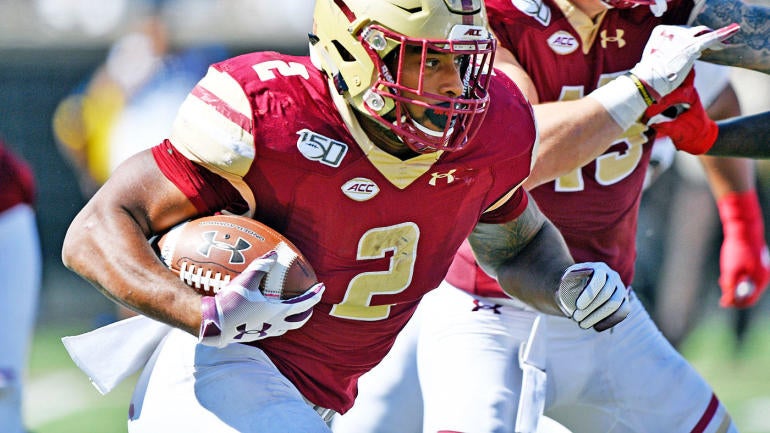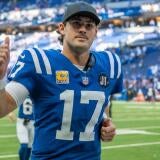NFC rookies to watch in 2020: AJ Dillon and 15 others who could immediately replace veterans
Picking one rookie for each NFC team who has what it takes to replace a veteran this season

Despite the ease at which one can assume rookies will struggle to quickly acclimate to the pro game due to the unusual offseason, first-year pros across the league will immediately replace more costly veterans in 2020. Bank on it. In some cases, these rookies will simply see the field more than their older teammates. In other situations, their rise will lead to the outright release of veteran players they will replace.
Below, you'll see all 16 NFC teams, the veteran who's set to be replaced and the rookie who will do the replacing. Here's the AFC version. Some of the established players have strictly been depth options during their pro careers and will give minimal cap relief to their respective teams if released. A few in line to be replaced are household names and will save their clubs plenty of money (and salary cap space) upon getting cut (or traded).
NFC East
Dallas Cowboys
Rookie: DT Neville Gallimore
Replaced veteran: DT Trysten Hill
Starting bold. Because, why not? Gallimore should've been a first-round pick. There I said it. Or wrote it. He was my No. 25 overall prospect and No. 3 defensive lineman behind Javon Kinlaw and Derrick Brown in the 2020 class. Gallimore's transformation from traditional nose tackle to upfield penetrator in 2019 at Oklahoma was that impressive.
And despite being a second-round pick just last year, Hill is in danger of spending another season mostly on the sidelines in Dallas due to inconsistent play and now the presence of Gallimore, Dontari Poe and Gerald McCoy in the middle of the Cowboys' defensive front.
New York Giants
Rookie: OL Matt Peart
Replaced veteran: OL Cameron Fleming
The Giants are less likely to move on from depth at offensive tackle after Nate Solder's opt-out, but Peart is the easy choice to replace the veteran Fleming on the right side of New York's line. The rookie is an ultra-long, smooth athlete with amazing pass-protection balance and recover ability. He can be an effective starter in Year 1 in the NFL.
Fleming was signed by New York in March and would create just $1.4 million if cut, so it's unlikely he'll be released before the season. But once considered someone who could start in 2020, Fleming is primed to be beaten out by Peart (if he's added some strength) in Daniel Jones' second campaign.
Philadelphia Eagles
Rookie: S/CB K'Von Wallace
Replaced veteran: S Jalen Mills
Wallace is a clean prospect for someone picked in the fourth round. He had 10 pass breakups, two picks, and 72 total tackles as a slot defender/safety/linebacker hybrid during his senior year at Clemson then crushed his combine with a blistering three-cone time of 6.76 seconds. He's comfortable changing positions snap to snap and can cover running backs, slots, and tight ends while providing sturdy run support.
Mills is probably the odd man out with Wallace in the mix. He played 49.1% percent of the snaps in 2019 and was a liability down the field despite defending seven passes. If he's released, Mills would save the Eagles $2 million.
Washington Football Team
Rookie WR Antonio Gandy-Golden
Replaced veteran: WR Cam Sims
Sims was the big wideout on Washington's roster in 2019, bounced back and forth from the practice squad to the active roster and finished the season with just three catches for 27 yards. With Kelvin Harmon out for the year with a torn ACL, Washington will likely want a large body in its receiver room, and Gandy-Golden has a more powerful, well-rounded game than Sims.
He has just enough flexibility to create the separation he needs to dominate with his physicality at the catch point and at 6-4 and 223 pounds, the Liberty product is an intimidating presence on the field.
NFC North
Green Bay Packers
Rookie: RB A.J. Dillon
Replaced veteran: RB Jamaal Williams
It's been Aaron Jones and Jamaal Williams as the one-two punch in Green Bay's backfield for the past two seasons. That doesn't mean it's going to stay that way for a third season. Actually, with how quickly backfields change in the modern NFL, the fact Jones and Williams have been in the same roles for two years should indicate their unlikely to have the same distinctions for a third.
Teams don't select running backs in the second round to have them stand on the sidelines or get the third-most carries in their rookie seasons. And Dillon is a unique runner, 6-0 and 247 pounds with 4.53 speed and phenomenal explosiveness. With Jones set to be the workhorse (obviously) there likely won't be enough carries to go around for three backs to be in a committee together. Williams will have an uphill climb to get the ball or even make the team in 2020. If he's cut, the Packers save $2.1 million.
Detroit Lions
Rookie: OG Jonah Jackson
Replaced veteran: OG Oday Aboushi
The fifth-round pick in 2013 has played on six teams to date in his NFL career and hasn't become a competent starter. He played 143 snaps last season in Detroit with marginal success. Jackson on the other hand, a true technician, has the workmanlike approach to win the starting right guard spot away from the 29-year-old. Despite average athletic talents, Jackson's balance, recovery skills, and vice grips for hands are easy to spot on film.
On an offensive line with maulers like Taylor Decker and Frank Ragnow, Jackson's finesse style will look obscure, but as he did at Ohio State in 2019, he'll get the job done. That will relegate Aboushi to the bench or even off the roster.
Minnesota Vikings
Rookie: LB Troy Dye
Replaced veteran: LB Ben Gedeon
Gedeon has been deep depth for the Vikings since the team made him a fourth-round pick in 2017, but his time on the roster could be running out. He's actually played well against the run, it's just that with Eric Kendricks and Anthony Barr at the linebacker spot, getting playing time at that position isn't easy.
Dye is the third linebacker Minnesota's picked since Gedeon joined the team, and he's NFL-ready with fluid coverage skills, rapid play-identification skills, and solid range against the run. Gedeon makes under $1 million, so there won't be a major financial gain if he's let go, however, there just won't be any room at the position on Minnesota's roster.
Chicago Bears
Rookie: CB Jaylon Johnson
Replaced veteran: CB Artie Burns
Johnson plays with zero hesitation on the outside and has the oily hips and light feet to click-and-close on the football on routes in front of him. He had six interceptions and 15 pass breakups over the past two seasons at Utah as a perimeter corner and possesses a solid athletic profile for a 6-0, 193-pound cornerback.
After four seasons of uninspiring play in Pittsburgh after the Steelers made him a first-round pick in 2017, Chicago signed Burns in free agency a few months ago, yet the starting gig won't be handed to him. Because the Bears won't save any money if he's cut, it's unlikely that happens, but Johnson is much more of a consistent playmaker than Burns, so it won't be shocking when the rookie wins the full-time gig across from Kyle Fuller.
NFC West
Seattle Seahawks
Rookie: TE Colby Parkinson
Replaced veteran: TE Luke Willson
Willson has been a complementary option in Seattle for six years -- with one season in Detroit -- but had just eight grabs for 79 yards in his return to the Seahawks in 2019. Now 30, Willson is set to be unseated by Parkinson, a contested-catch specialist who plays like a wide receiver down the seam.
The 6-7, 252-pound Stanford product led all tight ends in the 2020 draft class in contested catches (14), per Pro Football Focus. At his size, Parkinson's 4.77 time in the 40 is respectable. Beyond the play-making rookie -- whose specialty blends perfectly with Russell Wilson's style of play -- Seattle added Greg Olsen in free agency, gets Will Dissly back from injury and still have Jacob Hollister under contract. The latter caught 41 passes for 349 yards with three scores last season. Parkinson will be the presence that pushes Willson off the roster this year. And his cut will create $750,000 in cap space.
San Francisco 49ers
Rookie: WR Jauan Jennings
Replaced veteran: WR Dante Pettis
The 49ers have plenty of bodies at the receiver spot primed to be efficient targets for Jimmy Garoppolo in Kyle Shanahan's tremendously well-oiled scheme. With Deebo Samuel on the shelf for a while due to injury, it'll essentially be an open competition for secondary and tertiary targets in San Francisco.
Pettis was a second-round pick just two years ago but has been in Shanahan's doghouse for most of his young NFL career and was a healthy scratch often last season. While completely different bodies, Jennings, the large, yards-after-the-catch moose has the specific skill set to routinely impress Shanahan (he forced the most missed tackles among all receivers in the 2020 class per PFF) enough to bury Pettis even further on the depth chart or potentially lead to his release.
Arizona Cardinals
Rookie: OT Josh Jones
Replaced veteran: OT Justin Murray
Murray stood in admirably as a full-time starter at right tackle after Marcus Gilbert went down with an injury in 2019. In watching the film, it was clear Arizona would need an upgrade from him in the near future if Kyler Murray was going to take the next step as a young passer.
Enter, Jones, the team's third-round selection out of Houston. I still have no clue how he lasted until No. 72 overall after a super-sturdy four-year stint with the Cougars in which he mostly dominated the competition he faced. He was expected to be a first-round pick. He dialed in his footwork in 2019, had a breeze of a final collegiate season, then was the most impressive blocker at the Senior Bowl. He'll have to make the switch to the right side in Arizona with D.J. Humphries still locked into the left tackle spot, but he has the complete game to do it.
Los Angeles Rams
Rookie: EDGE Terrell Lewis
Replaced veteran: DE Morgan Fox
Last year, Fox played nearly 32% of the snaps and mustered two sacks with three tackles for loss, respectable figures for a former undrafted free agent from Colorado State-Pueblo. But he's bound to be replaced by Lewis, a player with a collegiate pedigree on the other end of the spectrum. Physically, the Alabama alum was the most unique edge rusher in the 2020 class because he looked like a safety on the field but measured in at 6-5 and 262 pounds with wing-like 33 7/8-inch arms. Lewis even has room to grow into his frame, a scary thought.
Fox is a big dude too at 6-3 and 275 pounds, but Lewis enters the NFL with a more refined collection of pass-rushing moves and displayed rare ability to bend/dip around the corner for a man as large as he is. The third-round pick will likely be asked to be the Rams' primary outside rusher in 2020.
NFC South
Tampa Bay Buccaneers
Rookie: S Antoine Winfield
Replaced veteran: S Jordan Whitehead
Whitehead saw the field on over 80% of the defensive snaps on a youthful and emerging Tampa Bay secondary and was a weak link at the safety position. He did defend nine passes but missed too many tackles and allowed plenty of pass-game production down the field in his coverage area.
The Buccaneers realized the safety spot needed to be addressed this offseason, so they picked the intuitive Winfield early in the second round. He was a fascinating prospect because his immense range seemed to strictly come from masterful play-diagnosing skills by way of film study -- he had seven interceptions in 2019. No one expected him to test well at the combine. Then he did. Winfield ran 4.45 at a compact 5-9 and 206 pounds.
This will sound lofty, but Winfield attacks the run almost identically to his dad who was probably the best run-support/tackling cornerback in the NFL over the past 25 years.
Atlanta Falcons
Rookie: iOL Matt Hennessy
Replaced veteran: OG Jamon Brown
Hennessy was my top center in the 2020 class, a blocker with a fun blend of natural leverage by way of a low center of gravity and athleticism useful in the run game and when needing to get lateral against gap-shooting penetrators on the inside. As a rookie, Hennessy is unlikely to replace longtime pivot Alex Mack in Atlanta but is in line to play one of the interior spots, most likely left guard opposite from 2019 first-round pick Chris Lindstrom.
Brown, who started at left guard last year for Atlanta but was mostly underwhelming, stands in Hennessy's way. Because of Hennessy's outstanding athletic gifts and the Falcons already knowing exactly what they have in Brown, it won't be a problem for the rookie to win the starting job away from the veteran.
Carolina Panthers
Rookie: EDGE Yetur Gross-Matos
Replaced veteran: EDGE Chris Smith
I don't know if I've ever seen a team revamp their defense quicker and more intensely than this year's iteration of the Panthers, and Luke Kuechly's surprise retirement was the icing on the cake. It's essentially Shaq Thompson, Tre Boston and all new faces on that side of the ball. That made this choice difficult.
Carolina signed Smith to a one-year deal in March after 8.5 sacks in 60 career NFL games with the Bengals, Browns, and Jaguars. While he's overachieved as a pro, Smith doesn't bring it athletically the same way Gross-Matos does. The Penn State product improved in pure one-on-one pass-rushing situations during his final season with the Nittany Lions. He used his hands more effectively and dipped around the corner when he felt he could win with his speed rush. The second-round pick will be the primary reason the veteran Smith doesn't get a ton of playing time in 2020, and if he's cut, the Panthers will save $750,000.
New Orleans Saints
Rookie: EDGE/LB Zack Baun
Replaced veteran: EDGE Anthony Chickillo
The Saints signed Chickillo in March after a mostly uninspiring five-year stint Steelers. Then, New Orleans traded up near the top of the third round to pick Baun an explosive, flexible edge rusher in a linebacker's body.
Chickillo's contract has an inconsequential amount of guarantees, and while bigger and stronger than Baun, he simply does not have the ability to win in as many ways as the rookie can around the corner. Plus, Baun provides some range toward the sideline as a run defender.


















